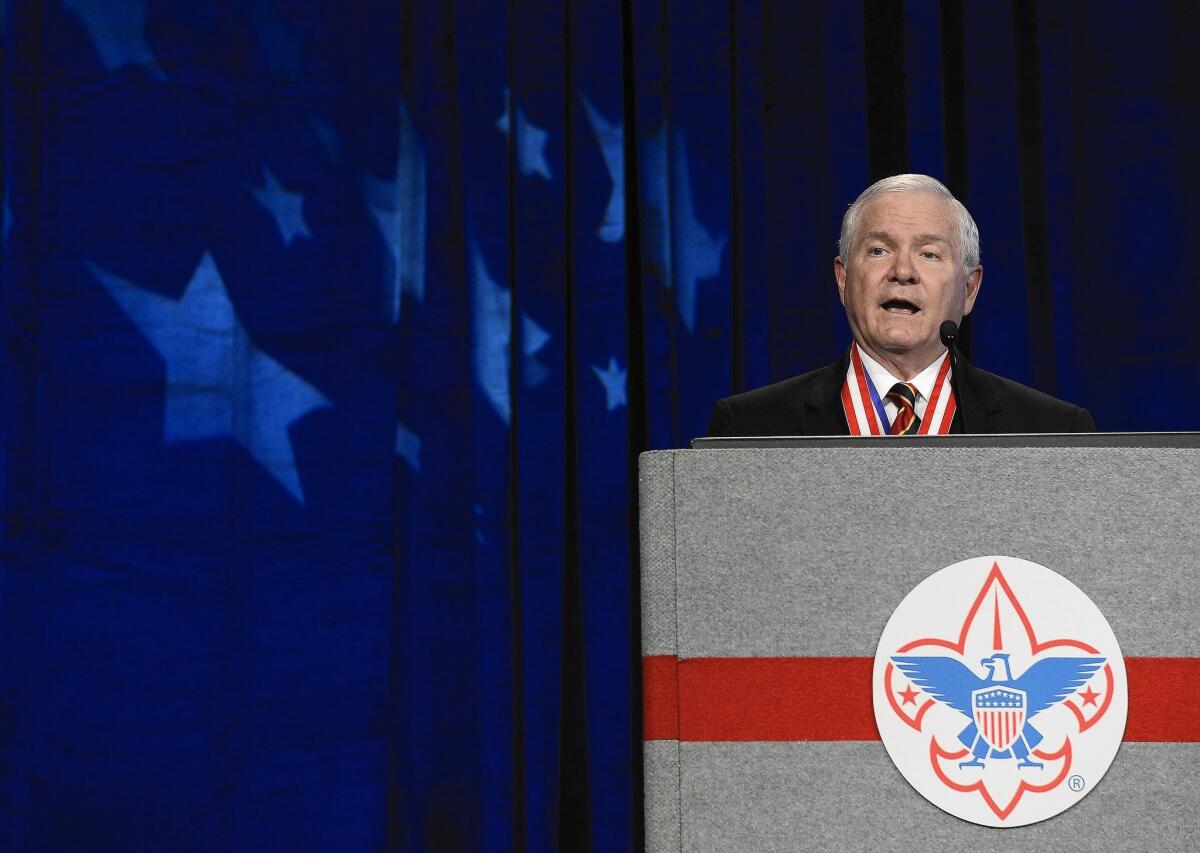How the Boy Scouts changed their stance on gay leaders

Robert Gates, president of the Boy Scouts of America, pushed to revise the policy on gay leaders.
- Share via
What a difference a year makes.
In May 2014, in his first speech as president of the Boy Scouts of America, former Secretary of Defense Robert Gates said he wouldn’t push the issue of gay leaders in the Scouts.
While he would have personally supported allowing gay troop leaders, he said, he would “oppose any effort” to reopen the discussion during his tenure. Such a debate, Gates said, could “provoke a formal, permanent split in this movement” that neither side would be likely to survive.
And yet, just 12 months later, Gates made a speech in which he said exactly the opposite: The Boy Scouts of America faced a threat to its very being if it did not reconsider its national ban on gay leaders, he told attendees at the same meeting in May of this year.
“I support a policy that accepts and respects our different perspectives and beliefs,” Gates said, adding that he supported allowing religious groups to set their own standards. “I truly fear that any other alternative will be the end of us as a national movement.”
Last week, the Boy Scouts announced that its executive committee had unanimously adopted a resolution that was much like what Gates proposed.
It would end the national ban on openly gay volunteer leaders, allowing local units to set their own policies. (This would mean religious organizations that charter Boy Scout troops could choose not to include gay leaders.)
If the change is ratified by the Scouts’ National Executive Board on July 27, it will become policy.
Gates’ experience with the repeal of the military’s “don’t ask, don’t tell” policy made him uniquely qualified to manage this likely transition for the Scouts. And his speech this May helped to pave the way for the changes that the executive committee has now approved.
Gates spoke about how quickly the country is changing, the need to “deal with the world as it is, not as we might wish it to be,” and his reasons for pushing for a revision to the policy.
“My only purpose — my only reason for assuming this leadership role — is to preserve the Boy Scouts of America in recognition of all it has done for this country, and all it can and must do in the future,” he said.
Yet while it was an urgent speech, it was also a reactive one. Gates did not call for changing policy because it was the right thing to do to be more inclusive, or because of the mixed message the policy was sending gay members about what the organization thought of them once they became adults.
Rather, his case for change was based on the challenges that he expected the organization would face if it didn’t adjust its ways.
In other words, Gates appears to be responding to pushback against the current policy, together with rapidly changing laws and public sentiment on the issues of gay rights.
In New York, the local Scouts council hired an 18-year-old openly gay Eagle Scout named Pascal Tessier to work at a camp this summer. In doing so, its leaders defied the national ban.
Richard Mason, a board member of the Greater New York Councils, told the New York Times that “this young man applied for a job. We judged his application on the merits. He’s highly qualified. We said yes to him irrespective of his sexual orientation.”
That kind of proactive leadership within an organization is key for forcing change on divisive issues.
New York wasn’t alone: Gates mentioned not only the New York council’s provocation in his May speech, but the “more and more councils taking a position in their mission statements and public documents contrary to national policy.”
He also noted churches that had rejected the national policy against gay leaders, a position that ended up “placing scouting between a boy and his church.”
No doubt the shifting legal and public opinion landscape on gay rights provided air cover for those local groups to defy the ban.
The Supreme Court’s recent landmark ruling on gay marriage, and state and local laws that increasingly prohibit discrimination based on sexual orientation, all make for a vastly different legal context. Legal threats may have played a role too.
But change on an issue as controversial as this one takes leadership from those at the top of the organization as well as lower down, especially in an entity as historically tied to the status quo as the Boy Scouts.
Gates may have been reactive and hesitant to push for change from the start, but he’s ultimately addressing the issue straightforwardly and with urgency.
The real credit, however, once again goes to those putting pressure on him from within the scouting community itself.
When local Boy Scout leaders decided that the best message they could send to young people was not about following a national rule but taking a stand for their beliefs, they exemplified what leadership in their organization ultimately looks like.
Jena McGregor writes a daily column analyzing leadership in the news for the Washington Post’s On Leadership section.
More to Read
Inside the business of entertainment
The Wide Shot brings you news, analysis and insights on everything from streaming wars to production — and what it all means for the future.
You may occasionally receive promotional content from the Los Angeles Times.










